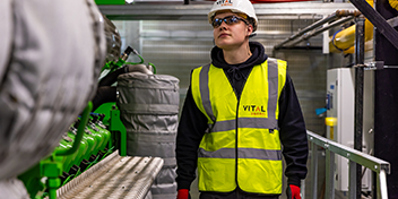The Engineering Council's regulatory work includes setting criteria for recognising learning and development programmes that meet the learning outcomes required for professional registration.
This section of the website aims to provide information, resources and guidance to support this important activity.
Programme recognition overview
Recognised programmes have been approved or accredited by one or more of the Licensed Professional Engineering Institutions (PEIs) as delivering some or all of the underpinning knowledge and understanding or competence for professional registration.
Higher education
Degrees may be accredited against the Accreditation of Higher Education (AHEP) Standard as delivering knowledge and understanding to support Chartered (CEng) or Incorporated (IEng) registration.
More information on higher education programmes
Further education and apprenticeships
Apprenticeships and other qualifications may be approved or accredited against the Approval of Qualification and Apprenticeships (AAQA) Standard.
More information on qualifications and apprenticeships
The approval process looks at the overall design, coverage and assessment strategy for programmes that may be delivered in multiple locations and seeks evidence that satisfactory quality assurance arrangements are in place. The accreditation process looks at programmes delivered in a specific location.
Assessing applicants for registration
All applicants’ knowledge, understanding and skills are assessed against the UK-SPEC standard of competence and commitment which sets the minimum requirements.
Applicants can demonstrate this underpinning knowledge either through having recognised qualifications, or through an individual assessment.
Recognised qualifications
Qualifications which provide the required level of knowledge and understanding are:
- CEng: An accredited integrated Masters degree or a combination of accredited Bachelors and Masters degrees, or equivalent qualification(s) or apprenticeship
- IEng: An accredited Bachelors degree or equivalent qualification(s) or apprenticeship
- EngTech: A recognised qualification(s) or apprenticeships at Level 3 A level/T level or equivalent
- ICTTech: A recognised qualification(s) or apprenticeships at Level 3 A level/T level or equivalent
In some cases, recognition demonstrates not just that a programme develops the knowledge and understanding that underpins competence, but also that competence is demonstrated through completion of the programme.
Applicants who have achieved the required learning outcomes through recognised qualifications do not need to undergo an individual assessment.
Individual assessment
Applicants who do not have the recognised qualifications will instead have an individual assessment of their qualifications and any other relevant learning. This may involve a technical report or technical interview.
Around half of all registrations are completed through this individual route, and this proportion is growing year on year.

Higher education ›
Everything you need to know about accredited engineering degrees, for students, providers and employers

Qualifications and apprenticeships ›
Approved qualifications and apprenticeships provide assurance that the standards set by the engineering profession are being met.

Search for your course ›
Search our database if your course opens up the start of your exciting journey to professional registration.





